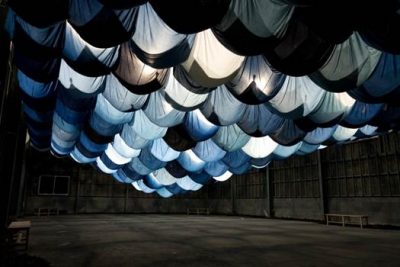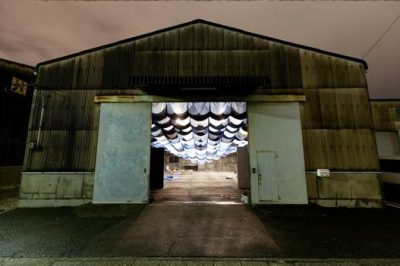Talk by Rowland Rickets: I am Ai, We are Ai

- This event has passed.
October 21st, 2017 @ 2:00 pm - 3:30 pm EDT
Cost: FreeDetails » Click here to register »
Talk by Rowland Ricketts: I am Ai, We are Ai
Indigo dye artist
Co-invitation with Textile Museum of Canada
In conjunction with Diligence and Elegance: The Nature of Japanese Textiles exhibition
Saturday October 21, 2:00-3:30 pm Doors will open at 1:00 P.M.
Admission free
Registration required below;
The region of Tokushima is known throughout Japan for the indigo, or ai, that has been grown there for more than 400 years. This lecture will explore the history and practice of indigo farming in the region and examine the current culture of indigo through the lens of the artist’s public art project I am Ai, We are Ai that was part of the National Cultural Festival hosted by Tokushima Prefecture in 2012.
http://www.rickettsindigo.com/category/rowland-ricketts/installations-exhibits/i-am-ai-we-are-ai/
Rowland Ricketts’ profile: http://www.rickettsindigo.com/
As one of the programs for the TMC’s exhibition “Diligence and Elegance: The Nature of Japanese Textiles,” the TMC will host internationally recognized textile artist Rowland Ricketts, providing public access to this pioneering figure in the use of natural dyes and historical processes to create contemporary textiles that span art and design.
Trained in indigo farming and dyeing in Japan, Rowland Ricketts grows and processes his own indigo (Polygonum tinctorium) in the USA, using centuries-old Japanese methods. He consciously favours slower, natural processes and materials over more immediate, synthetic options. Today, with petroleum-derived indigo readily and cheaply available, his choice to plant, transplant, weed, harvest, winnow, dry, and compost the indigo by hand is not one of necessity. Instead it is a conscious act of recognition that all the energy extended in the farming and processing is just as much a part of the final dyestuff as the indigo molecules themselves.
Learning about plant dyes and how to grow indigo is Ricketts’ life work, leading him to understand that craft traditions are formed through the intimate relationship of people and their immediate environment. Ricketts’ knowledge and experience is extremely unique, and while there is a vast appetite for his expertise in this indigo field, Canadians haven’t explored the cultivation and processing in depth – in part because of our climate. Ricketts has brought generations of Japanese knowhow into his own practice and now is making it a priority to share that expertise around the globalized world.
The culture of textile crafts is under constant examination throughout our exhibitions that feature historic textiles from the Museum’s collections juxtaposed with the work of contemporary artists who are committed to the understanding and appreciation of traditional textiles from the past and present. Ricketts’ own experiences with indigo – first as an apprentice in Japan followed by years of working with and learning from this dye in that country and the USA – have made him aware of a connection that leads not just from his teachers to his own practice, but one that reaches back to his teacher’s teachers and the people they learned from. His visit to the TMC will be timely, as the Museum will be hosting an exhibition of Japanese textiles that focuses on the highly refined skills and practices by which textiles have been constructed and decorated, and on how diligence and ingenuity have shaped their timeless beauty.
Rowland Ricketts is an artist whose approach stems from his unusually intimate and comprehensive involvement in the making of his works, from start to finish, including growing the materials used to create his dyes. He learned the technique of traditional indigo dyeing while working as an apprentice in an indigo farm and dyeing studio in Tokushima, Japan, and subsequently established his own indigo farm in 2000 with his wife Chinami Ricketts in Bloomington, Indiana, where he teaches at the Henry Radford Hope School of Fine Arts at Indiana University. He uses centuries-old methods to cultivate and process his own indigo, stepping outside the mainstream dependence on synthetic colourants or petroleum derived indigo. His idea of making starts with the seed, and he focuses on a mode of making that requires time and intimate relationship with the natural world, and in so doing, links his contemporary work to long-standing borrowed traditions. As a craft-based artist who employs pioneering strategies to define space and to redefine our relationship to materials, physically or perceptually, Rowland Ricketts is experiencing growing recognition and acclaim through his work, as he expands the borders between fields of artistic and intellectual practice.
Rowland Ricketts was born in 1971, and received his BA in East Asian Studies from Wesleyan University, Middletown, Connecticut, and his MFA in Fibers from Cranbrook Academy of Art in Bloomfield Hills, Minnesota. He worked for a number of years in Japan, teaching English and learning how to farm indigo and make dye. At present he is Assistant Professor, Textiles at the Henry Radford Hope School of Fine Art, Indiana University in Bloomington, Indiana, and connects his curriculum and his students with the seasonal growing cycle of indigo, and they grow and harvest dye plants on his farm as part of their classes and studio work. His work has been exhibited at the Textile Museum (Washington, DC), Museum of Fine Arts, Boston, Cavin-Morris Gallery (New York), and Douglas Dawson Gallery (Chicago) and has been published in Textiles Now, FiberArts, Selvedge, Surface Design Journal, and Hand/Eye Magazine.


